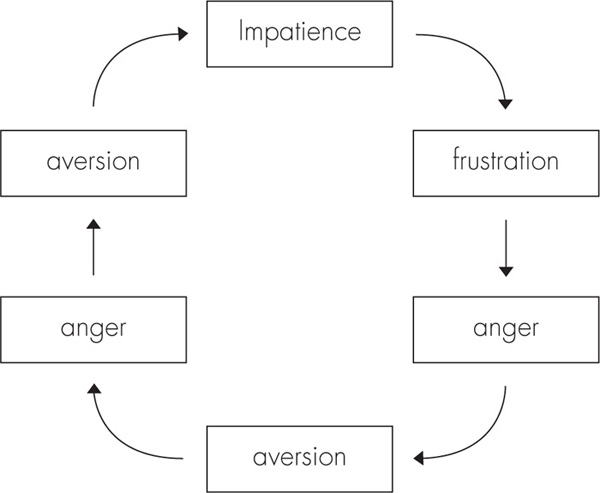This book is a real joy ... Michael has laid it out clearly, succinctly and approachably. Its a wonderful mix of clear, practical guidance and sound scientific evidence. Read this book, follow and practise the guidance, and enjoy the fruits!
Rebecca Crane , Director, Centre for Mindfulness Research and Practice, Bangor University
Before I met Michael I thought I knew all there was to know about my thoughts. I was wrong.
Eight weeks on I knew a feeling of space and calm. The internal chatter of my mind was there but not so demanding or noisy. Instead, I was just enjoying a new sense of seeing the world as it is rather than as the setting for my own thoughts.
David Sillito , Media and Arts Correspondent, BBC
This book provides a highly accessible way for people to learn mindfulness, experience its potential to relieve suffering, and cultivate joy, compassion and wisdom.
Willem Kuyken , Professor of Clinical Psychology, Exeter University
Mindfulness in Eight Weeks is a clear, practical and wise companion as you embark on the journey of transformation outlined in the books programme. With its balance of scientific knowledge, detailed meditation instructions and tips on how to bring mindfulness into daily life, it is indeed a trustworthy and accessible manual as, step by step, you change your mind and change your life.
Vidyamala Burch , Author and co-founder of Breathworks CIC
A great book for both novices and those familiar with mindfulness practice I highly recommend it.
Mark Williams Co-Author of the bestselling Mindfulness: A practical guide to peace in a frantic world
The ideas and practices discussed here truly change lives.
Dr. John Teasdale Co-Author: Mindfulness-Based Cognitive Therapy for Depression
As we campaign in Parliament and in government to raise awareness of the benefits of mindfulness training more generally, I hope this new book will open many more eyes to the great benefits that are so readily available with mindfulness practice.
Chris Ruane MP
Unpleasant and unwanted experiences are an inevitable part of life.
In certain respects you dont have any choice unpleasant and unwanted experiences are inevitable. However you try to set things up, however clever you are about organising yourself and building the life you want for yourself and your loved ones, youll never eradicate the unwanted. It cant be done. Where you do have a choice, however, is how you respond to the unwanted when it turns up.
As we saw in the previous chapter, there is a natural human tendency to react to the unwanted with aversion. We also saw how mindfulness practice opens up a space of choice. Instead of blindly reacting, its possible to mindfully respond and that move from reaction to response can open a gateway onto a path of increasing freedom.
 Box 1: Another Way of Being with What is Difficult
Box 1: Another Way of Being with What is Difficult
In the UK these days, border controls at the airports are increasingly stringent and are often understaffed. That means that at busy times the queues there can really build up and seasoned air travellers make a point of learning to work these so they dont have to wait too long.
Sarah was one such passenger. Returning to London from a short trip to Germany, she only had carry-on luggage with her. Shed organised herself a seat near to the front of the plane and as soon as the doors opened she began her dash, walking at a sharp clip to get ahead of the other passengers when they arrived at passport control.
To her dismay, she arrived at the immigration hall to find long lines at each desk. The electronic passport section also wasnt working. When will they get that technology sorted? she muttered inwardly and irritably to herself as she scanned the lines looking for what seemed to be the shortest queue.
Making her choice, she joined a line and stood, waiting, tapping her fingertips against her thigh with barely suppressed impatience.
But shed not made the smart choice she thought she had. After a few minutes, the official at the desk took someones passport and walked off for a consultation with his supervisor. No one replaced him at the desk, but all the other lines had by now grown and none were moving very quickly anyway. Sarah was stuck and she began to fume. She turned to the person behind her in the queue: This is so incompetent! Look at these lines! What kind of message is this sending to visitors to our country? But the person behind her didnt want to engage with that and Sarah was left stewing. Her jaw was painfully tight, her shoulders tensed and her stomach was clenched.
Then she remembered something she had heard when she attended a mindfulness taster session that had been offered to people at her work. OK, she thought, theres nothing to lose, lets try that now. She turned her attention to her body, first to the clenched sensation in her stomach. To her surprise, it was hot there really intense. It was almost as if she had a kettle boiling inside. Gosh, she thought, Im steaming inside really steaming! Standing with that sensation and that image, breathing with it, she found herself increasingly interested in what was happening inside her. It was so complex. There was the feeling of heat, the complex of tensions, the feeling of resistance to those tensions
And then to Sarahs complete astonishment the whole picture changed. In an instant. All that tension dropped away. The heat just vanished, and she stood there, amazed, breathing waiting patiently in line and wondering at what shed just experienced.
Sarah turned towards what she was experiencing. She paid attention to how her feelings of anger and frustration were showing up in her body, and then those feelings and sensations suddenly vanished. Lets take a closer look at what went on here.
To begin with, the long and unpredictable queues at passport control produced feelings of anger and frustration for Sarah. Those are themselves unpleasant feelings and they gave rise to feelings of aversion Sarah didnt want to be experiencing them. That set up a feedback loop.
In Sarahs mind at first anyway the UK border controls were responsible for her anger and frustration. But she then came to see that it was actually something else altogether. It was her attitude of avoidance that was keeping the system in place. So long as she remained unmindful of the aversive system that was feeding and sustaining her anger, it stayed in place. But the moment she switched from an avoidant mode of mind into an approach mode of mind, turning towards her experience with interest and curiosity, she stopped fuelling those self-perpetuating loops and the whole situation changed.
This story illustrates one of the central messages of the mindfulness approaches: it is your relationship to what is difficult or challenging that keeps you stuck in suffering not the unpleasant feelings and sensations that often come alongside difficulty or challenge.
As we saw earlier, a central aspect of mindfulness is that it calls on us to allow what is the case to be the case. We also saw that this allowing attitude comes alongside another set of attitudes: kindness, gentleness and curiosity. At this stage in the course, I hope youre beginning to get something of a flavour of all these attitudes. The aim of this weeks practice is to take all of that one stage further.
Allowing: Letting Things Be
This week, the course asks you to begin to experiment with simply allowing difficult or challenging experiences along with the thoughts, feelings, sensations and impulses that come with them, to remain in awareness without trying to change or get rid of them.
Next page
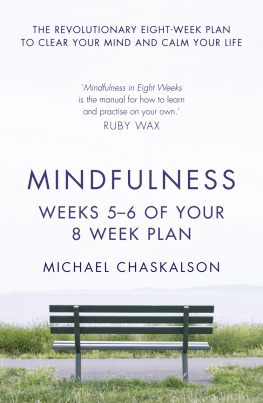
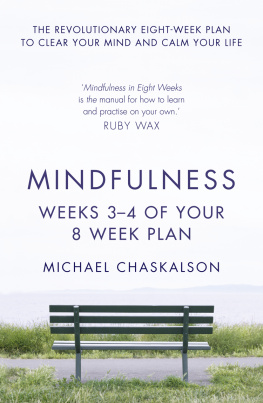
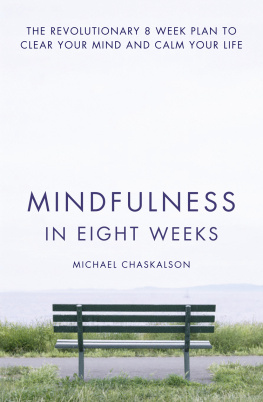
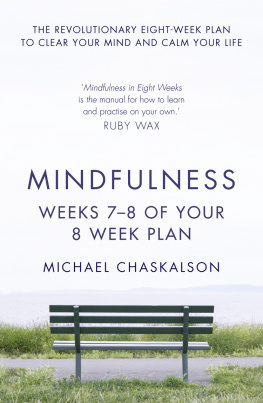
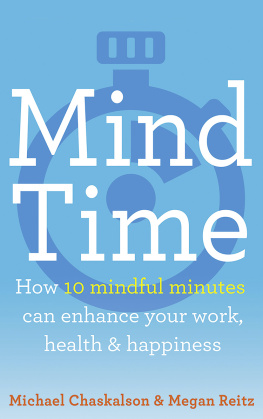
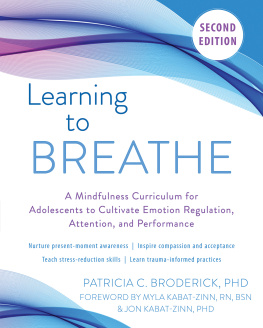

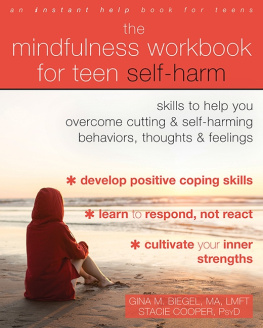
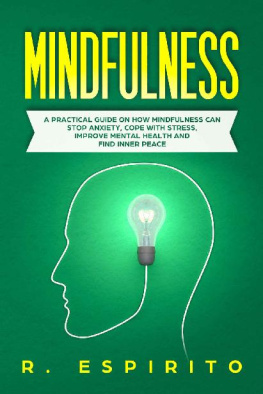
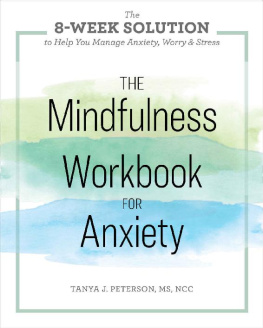
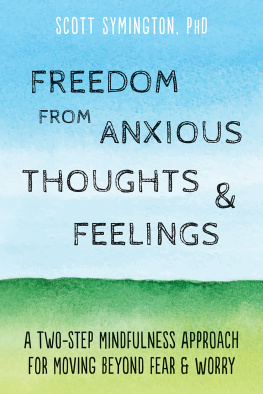
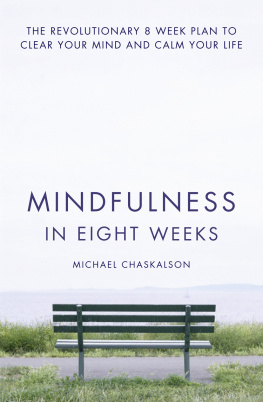
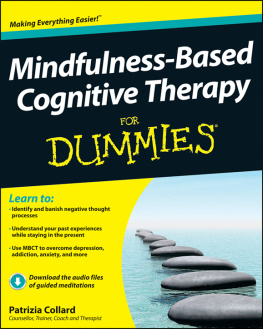
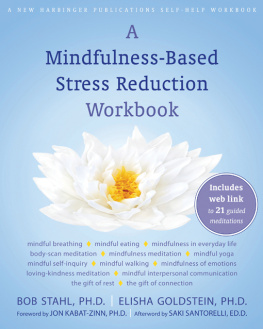
 Box 1: Another Way of Being with What is Difficult
Box 1: Another Way of Being with What is Difficult